 Apple is elbowing its corporate presence onto Glastonbury Festival with a launch at world famous music event later this week, according to a report in MacWorld.
Apple is elbowing its corporate presence onto Glastonbury Festival with a launch at world famous music event later this week, according to a report in MacWorld.
Details are nearly as scarce as festival tickets, but the site cites third-party reports suggesting that all will be revealed on Friday, June 24 at the East Dance stage, where the first act up listed in the official Glastonbury Festival website is called, “iTunes present…”
 This will feature winners of a competition run between iTunes and Hit40UK which asked budding musos to create a five-song iMix of tracks they felt appropriate for kick-starting the Dance stage this year.
This will feature winners of a competition run between iTunes and Hit40UK which asked budding musos to create a five-song iMix of tracks they felt appropriate for kick-starting the Dance stage this year.
The competition page ran the blurb: “Runners-up will also bag themselves some great iTunes Glastonbury Essentials cards which get them 75 tracks of the hottest Glastonbury tunes on the iTunes Music Store”. Apple’s Glastonbury Essentials compilation was listed as being worth £19.75 (~€30, ~US$36).
MacWorld mulls over the suggestion that these iTunes “Essentials cards” could auger an extension of Apple’s existing band promo cards.
 These take the form of fan-tempting collectible iTunes cards stuffed full of band-specific artwork and special codes that let mustard-keen fans download tracks from a specific artist or album.
These take the form of fan-tempting collectible iTunes cards stuffed full of band-specific artwork and special codes that let mustard-keen fans download tracks from a specific artist or album.
These cards have previously been used as tickets to events like Apple’s “Live from London”.
Naturally, we’ll be at Glastonbury trying to get our hands on some of these “Essential cards”, but with thousands of more interesting non-corporate offerings on display, we can’t promise that we won’t get hopelessly sidetracked at the world’s greatest festival.
 It’s not yet confirmed, but it appears that Google is preparing to challenge PayPal with its own online electronic payment system, rumoured to be called ‘Google Wallet’.
It’s not yet confirmed, but it appears that Google is preparing to challenge PayPal with its own online electronic payment system, rumoured to be called ‘Google Wallet’.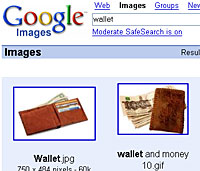 Sellers who run auctions on eBay are major buyers of Google’s ads, which appear alongside search results, so it’s not surprising to see the company angling in for a slice of the payment action.
Sellers who run auctions on eBay are major buyers of Google’s ads, which appear alongside search results, so it’s not surprising to see the company angling in for a slice of the payment action.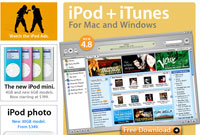 Sony BMG Music Entertainment has announced that it intends to add copy-restricting software to its latest CDs.
Sony BMG Music Entertainment has announced that it intends to add copy-restricting software to its latest CDs. This doesn’t affect Apple computer users – they can freely copy and transfer music from the restricted CDs to their iPods – but consumers using Microsoft’s Windows software won’t hear a note, although they will be able to transfer music to Windows Media-supporting devices.
This doesn’t affect Apple computer users – they can freely copy and transfer music from the restricted CDs to their iPods – but consumers using Microsoft’s Windows software won’t hear a note, although they will be able to transfer music to Windows Media-supporting devices. A report by compilers Mintel International has revealed that pets are being ousted by consumer electronics in British homes.
A report by compilers Mintel International has revealed that pets are being ousted by consumer electronics in British homes. The study observed that, “In those families with children, the demand for pets may not be as strong as it once was, since many children now prefer to immerse themselves in the world of computer games and TV programmes”.
The study observed that, “In those families with children, the demand for pets may not be as strong as it once was, since many children now prefer to immerse themselves in the world of computer games and TV programmes”. But it’s not all bad news for our precious pampered pooches and treasured tabbies, with the report revealing that sales of pet food, accessories and pet insurance have rocketed by 24 percent in the past five years, reaching a total of US$6.5 billion.
But it’s not all bad news for our precious pampered pooches and treasured tabbies, with the report revealing that sales of pet food, accessories and pet insurance have rocketed by 24 percent in the past five years, reaching a total of US$6.5 billion. With the rise of home entertainment robots like the Sony Aibo and the forthcoming Nintendo virtual pet game, Nintendogs (where virtual dogs will respond to voice commands and bark at passing Nintendog consoles), we wonder how long it will be before children think that pets live on batteries.
With the rise of home entertainment robots like the Sony Aibo and the forthcoming Nintendo virtual pet game, Nintendogs (where virtual dogs will respond to voice commands and bark at passing Nintendog consoles), we wonder how long it will be before children think that pets live on batteries. Vodafone has made their service more alluring to international business travellers by cutting roaming charges on their 3G data networks.
Vodafone has made their service more alluring to international business travellers by cutting roaming charges on their 3G data networks.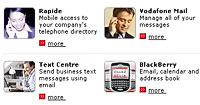 According to analysts Gartner, the new prices demonstrate that operators are currently charging too much; “This is a sign that mobile operators are starting to recognise they charge too much for roaming data services,” they added, as your writer’s head nodded vigorously in agreement (while making snarling noises in the direction of T-Mobile).
According to analysts Gartner, the new prices demonstrate that operators are currently charging too much; “This is a sign that mobile operators are starting to recognise they charge too much for roaming data services,” they added, as your writer’s head nodded vigorously in agreement (while making snarling noises in the direction of T-Mobile). Gartner noted that with Vodafone only selling sold 300,000 3G data cards since launching the 3G data network in January 2004, the company is hoping that the reduced roaming charges will boost this figure.
Gartner noted that with Vodafone only selling sold 300,000 3G data cards since launching the 3G data network in January 2004, the company is hoping that the reduced roaming charges will boost this figure. After a long cuddle on the sofa, Napster and Ericsson have announced a global partnership to offer a fully integrated new digital music service aimed at mobile phone customers around the world.
After a long cuddle on the sofa, Napster and Ericsson have announced a global partnership to offer a fully integrated new digital music service aimed at mobile phone customers around the world.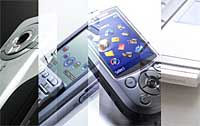 The two companies hope that their service will allow mobile operators to get their grubby mitts on the “growth opportunities for personalised digital entertainment on the mobile phone and PC” and will, no doubt, include the usual slew of lucrative, downloadable offerings like ringtones, master tones, images, wallpaper and video content.
The two companies hope that their service will allow mobile operators to get their grubby mitts on the “growth opportunities for personalised digital entertainment on the mobile phone and PC” and will, no doubt, include the usual slew of lucrative, downloadable offerings like ringtones, master tones, images, wallpaper and video content. More and more mobile operators are already cutting themselves a slice of the mobile digital music services pie, with the largest Korean mobile phone operator recently purchasing a controlling stake in the country’s biggest record label.
More and more mobile operators are already cutting themselves a slice of the mobile digital music services pie, with the largest Korean mobile phone operator recently purchasing a controlling stake in the country’s biggest record label. Yahoo has whipped out its wallet and snapped up DialPad Communications, a company making VoIP software allowing users to make cut-price calls over the Internet.
Yahoo has whipped out its wallet and snapped up DialPad Communications, a company making VoIP software allowing users to make cut-price calls over the Internet. The company offers a selection of VoIP subscription plans to users – including prepaid VoIP calling cards – with charges ranging from as little as 1.7 cents per minute for calls to more than 200 countries.
The company offers a selection of VoIP subscription plans to users – including prepaid VoIP calling cards – with charges ranging from as little as 1.7 cents per minute for calls to more than 200 countries. In its announcement, Dialpad served up a bit more information about the deal: “Yahoo plans on leveraging Dialpad’s PSTN calling capabilities to add to Yahoo Messenger’s recently enhanced PC-to-PC voice calling offering. These products are very complementary and by combining our strengths, we are better positioned to take advantage of the fast growing IP telephony market and build a range of exciting new services.”
In its announcement, Dialpad served up a bit more information about the deal: “Yahoo plans on leveraging Dialpad’s PSTN calling capabilities to add to Yahoo Messenger’s recently enhanced PC-to-PC voice calling offering. These products are very complementary and by combining our strengths, we are better positioned to take advantage of the fast growing IP telephony market and build a range of exciting new services.” BT has unveiled a smarty-pants phone designed to integrate landline and mobile phone technologies.
BT has unveiled a smarty-pants phone designed to integrate landline and mobile phone technologies. BT Fusion is part of the company’s strategy to lure back customers wooed by mobile telephonic temptresses touting cheap calls.
BT Fusion is part of the company’s strategy to lure back customers wooed by mobile telephonic temptresses touting cheap calls. “The future will be convergence”, insisted Livingstone. “This is going to be a market that grows fantastically over time even though it might take a while to get going. We still expect many millions of converged handsets by the end of the decade.”
“The future will be convergence”, insisted Livingstone. “This is going to be a market that grows fantastically over time even though it might take a while to get going. We still expect many millions of converged handsets by the end of the decade.” Calls to landlines originating in the home will be ratcheted up at BT’s regular rate of 5.5 p (10 cents, €0.08) for up to an hour.
Calls to landlines originating in the home will be ratcheted up at BT’s regular rate of 5.5 p (10 cents, €0.08) for up to an hour. Smarting daily from the soaring popularity of its upstart rival Firefox, Microsoft is hoping to stem the exodus by bolting on new security features to their next version of Internet Explorer browser.
Smarting daily from the soaring popularity of its upstart rival Firefox, Microsoft is hoping to stem the exodus by bolting on new security features to their next version of Internet Explorer browser.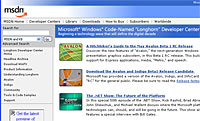 With Internet Explorer losing friends fast because of its unsavoury reputation as a honeypot for homepage hijackers and skulking spyware, these new security features can’t come too soon for Microsoft.
With Internet Explorer losing friends fast because of its unsavoury reputation as a honeypot for homepage hijackers and skulking spyware, these new security features can’t come too soon for Microsoft.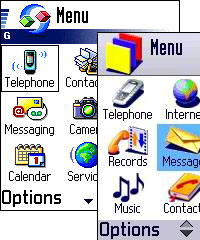 Finnish mobile phone giants Nokia have launched a new Web browser for their Series 60 smartphones.
Finnish mobile phone giants Nokia have launched a new Web browser for their Series 60 smartphones.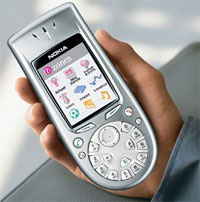 “Nokia is excited to enrich Series 60 with optimised mobile Web browsing. Open source software is an ideal basis for development since it enables Nokia to leverage and contribute to speedy software innovation and development. As a result, the entire Series 60 value chain, from manufacturers and operators to end-users, will benefit from the flexible architecture, full Web compliance and a truly enjoyable user experience,” enthused Pertti Korhonen, Chief Technology Officer, Nokia.
“Nokia is excited to enrich Series 60 with optimised mobile Web browsing. Open source software is an ideal basis for development since it enables Nokia to leverage and contribute to speedy software innovation and development. As a result, the entire Series 60 value chain, from manufacturers and operators to end-users, will benefit from the flexible architecture, full Web compliance and a truly enjoyable user experience,” enthused Pertti Korhonen, Chief Technology Officer, Nokia.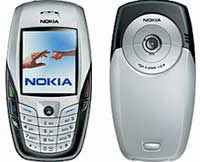 Philip Schiller, Apple’s senior vice president of Worldwide Product Marketing reckons the new browser is the dog’s nadgers: “The Safari Web Kit’s blazing performance, efficient code base and support for open standards make it an ideal open source technology for projects like Nokia’s new Series 60 browser.”
Philip Schiller, Apple’s senior vice president of Worldwide Product Marketing reckons the new browser is the dog’s nadgers: “The Safari Web Kit’s blazing performance, efficient code base and support for open standards make it an ideal open source technology for projects like Nokia’s new Series 60 browser.”